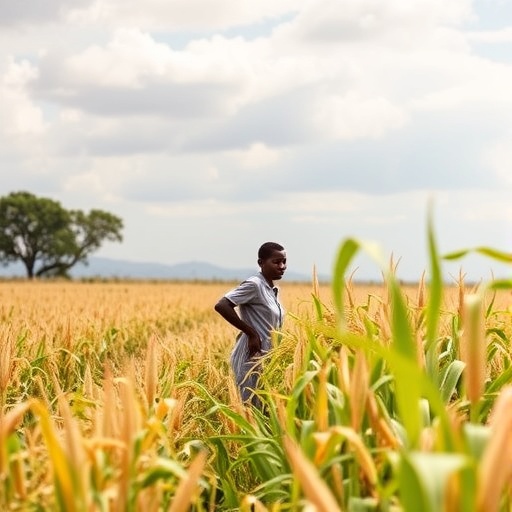
In the heart of Malawi, a significant transformation is underway, centering around the countryâs agricultural productivity. Recent research by Nyirongo and Khataza sheds light on the intricate relationship between farm input subsidies and fertilizer use, particularly in the context of maize production. The analysis conducted by these researchers indicates a strong correlation between subsidy programs and improved agricultural outcomes, revealing a narrative where governmental support plays a pivotal role in enhancing food security.
Fertilizer use in Malawi has historically been plagued by low adoption rates among farmers, primarily due to cost barriers and a lack of access to high-quality inputs. This challenge is further exacerbated in rural areas where smallholder farmers, most of whom rely on subsistence farming, struggle to procure sufficient agricultural resources. In their study, Nyirongo and Khataza argue that farm input subsidies could potentially bridge this gap, promoting greater fertilizer application and leading to substantial increases in maize yields.
The implications of this research are far-reaching, particularly given the centrality of maize in Malawian diets and its significance as a staple food. Notably, maize accounts for almost half of the caloric intake for the majority of the population, thus underscoring the importance of enhancing its productivity. By analyzing the impact of input subsidies on various local farming practices, the authors highlight a notable uptick in fertilizer usage, which in turn favors higher maize output. Such findings are crucial for policymakers aiming to combat food insecurity and improve agricultural resilience.
One of the standout observations from the research is the effect of subsidies on not only fertilizer use but also on farmersâ overall attitudes toward agricultural investment. When financial assistance in the form of input subsidies is available, farmers demonstrate a greater willingness to experiment with different farming techniques, leading to long-term improvements in their agricultural practices. This shift in mindset is indicative of a broader movement towards modernizing Malawian agriculture, aligning it with contemporary farming methodologies that prioritize higher efficiency and sustainability.
Furthermore, the research underscores that the impact of subsidies is not uniform across all demographics. While many farmers reported enhanced yields, there remains a segment of smallholders who are either unaware of such subsidy programs or faced challenges in accessing them. This disparity raises critical questions regarding the equitable distribution of resources and the need for targeted outreach efforts to ensure that all farmers can benefit from governmental assistance.
In examining the economic ramifications, Nyirongo and Khataza emphasize that the added productivity resulting from increased fertilizer application directly correlates with enhanced income for smallholder farmers. This economic upliftment has the potential to initiate a positive feedback loop, where increased earnings allow for further investment in farm improvements, creating a cycle of growth and advancement within the agricultural sector.
Moreover, the environmental implications of increased fertilizer use cannot be overlooked. The research suggests that while the benefits of enhanced maize productivity are clear, there is a pressing need for responsible management and practices that mitigate potential negative environmental impacts. The balance between maximizing yields and preserving soil health becomes paramount, as excessive fertilizer application can lead to environmental degradation if not managed properly.
The study’s findings also resonate with broader global discussions on food security and climate change adaptation. With climate variability posing serious threats to agricultural production systems, the insights gained from Malawi’s experience could be highly instructive for other nations grappling with similar challenges. The emphasis on improving input access and agricultural productivity reflects a growing consensus on the need for integrative approaches that consider both economic and sustainable developmental goals.
As the discourse surrounding agricultural subsidies continues to evolve, it is crucial for Malawian policymakers to carefully consider the evidence presented by Nyirongo and Khataza. The approach of subsidizing essential inputs like fertilizers could serve as a template for broader agricultural reforms aimed at bolstering productivity while simultaneously addressing fundamental issues surrounding food security.
The positive narrative emerging from their research offers a critical opportunity for stakeholders in the agricultural sector â from government officials to private investors â to align efforts towards sustainable agricultural development. By reinforcing the provision of fertilizers through subsidies, Malawi stands poised to enhance its agricultural outcomes significantly, vastly improving the living standards of its rural communities and promoting national food sovereignty.
In conclusion, the implications of Nyirongo and Khatazaâs research extend beyond mere academic interest; they resonate deeply within the fabric of Malawian society and its agricultural landscape. The potential to fundamentally reshape agricultural productivity through strategic subsidy interventions indicates a path forward not just for Malawi, but for other nations facing similar agricultural and economic challenges. Embracing these insights could help redefine the narrative of food security, shifting from a plight of scarcity to a future brimming with agricultural abundance.
Subject of Research: The impact of farm input subsidies on improving fertilizer use and enhancing maize productivity in Malawi.
Article Title: The impact of farm input subsidies on improving fertilizer use and enhancing maize productivity in Malawi.
Article References:
Nyirongo, B.B., Khataza, R. The impact of farm input subsidies on improving fertilizer use and enhancing maize productivity in Malawi.
Discov Agric 3, 96 (2025). https://doi.org/10.1007/s44279-025-00255-y
Image Credits: AI Generated
DOI: 10.1007/s44279-025-00255-y
Keywords: farm input subsidies, fertilizer use, maize productivity, Malawi, agricultural development, food security.
Tags: agricultural productivity enhancementfarm subsidies in Malawifertilizer use in agriculturefood security in Malawigovernmental support for agriculturehigh-quality fertilizer accessimpact of subsidies on farmingmaize as a staple foodmaize yield improvement strategiesrural agriculture developmentsmallholder farmer challengessubsistence farming solutions




